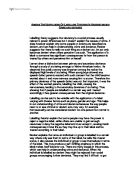Assess the usefulness of the labelling theory as an approach to the study of crime and deviance
Assess the usefulness of labelling as an approach to the study of crime and deviance.
In sociology’s study of crime and deviance, basically all of the theorist, excluding notably the Marxist theory, suggest that there is a difference between those who offend and those who do not, and search for key factors that lead people to offend. However, there are a group of theorist who reject this idea and instead suggest that most people commit deviant and criminal acts, but only some people are caught and stigmatised for it and that stress should be placed upon understanding the reaction to and definition of deviance rather than on the causes of the initial act. Although the labelling theory is quite prominent in the study of crime and deviance, there are as always its endorsers and it criticisers who both give valid accounts to why this theory should be, or not be taken as a valid theory.
Firstly, Becker, one of the exponents of the labelling theory, who states that “ Deviancy is not a quality of the act a person commits but rather a consequence of the application by others of rules and sanctions to an offender. Deviant behaviour is behaviour that people so label.” Becker points out a piece of anthropological research which shows undeniably, how this statement is proven in some cultures. The study was of a traditional culture on a Pacific Island conducted by Malinowski which describes how a youth killed himself because he had been publically accused of incest. When first asked about incest, the islanders had retorted in disgust, but when pressed on the matter, it was revealed that many had committed acts of incest and that it was not uncommon, providing those involved were discreet. However, as the case had become public knowledge, the islanders reacted with abuse, the offenders were ostracised and in this case driven to suicide. Becker draws from this evidence that just because someone breaks a rule, it does not necessarily follow that others will describe it as deviant, and only if a person is successfully labelled, consequences follow. So, due to this evidence you can see that in some cultures, the labelling theory’s ideas are there for sociologists to see, however it is argued that it can only really be seen in primitive societies that are not as complex as postmodern societies for example.







